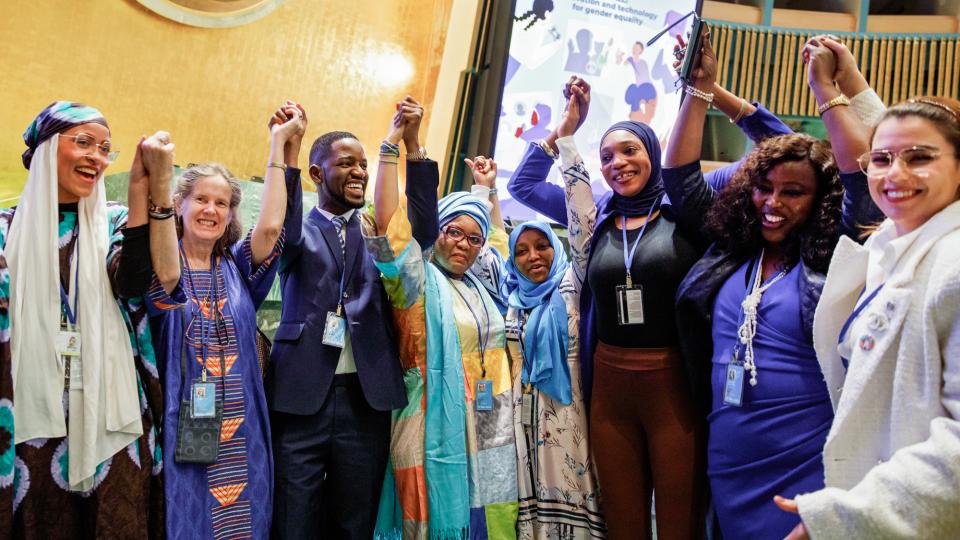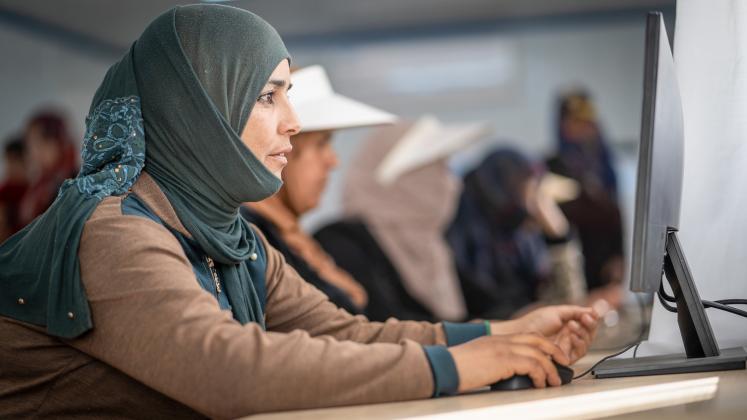Last year, the United Nations Commission on the Status of Women (CSW) convened global stakeholders to examine the progress made on gender equality through the lens of innovation, technology and digital education. Among the Commission’s many insightful conclusions was its recognition of the promises and perils of artificial intelligence (AI).
Although AI has vast potential to transform how employment, public services and education benefit women and girls, without equal access to technology — and a role in shaping it — AI will likely perpetuate existing biases, discrimination and inequality.
Artificial intelligence, a term coined in 1955, is not new. But the past few years have seen such technologies leap to the forefront of our vernacular. From mobile apps and cameras, to career tools, cars and autonomous weapons, there is a seemingly insatiable appetite for, and growing anxiety about, AI.
As we hit this global turning point in our awareness of this frontier, we are also approaching a point of no return in our ability to govern its impacts. Now is our opportunity to ensure AI promotes peace and sustainable development, and that it aligns with global efforts to achieve gender equality and empower all women and girls.
CSW will convene again in mid-March, in New York, for its 68th annual session. This year, the Commission will address the theme of poverty and ways to strengthen institutions and financing with a gender perspective — vital components of realizing gender equality. But, under CSW’s five-year review cycle, there may not be a full assessment of progress made on 2023’s technology-related recommendations until 2028.
If women are not shaping the technologies of the Fourth Industrial Revolution on an equal footing, then the future digital economy, and the AI that will influence it, risk being built on stereotypes of the past.
The rapid pace of advancement, however, means that we must take urgent action to govern the development and use of AI. In line with some of the conclusions of CSW’s 67th session, there are critical areas for action we can take now that will prepare us for evolving threats to gender inequality.
First, we must increase the representation of women in the technology and AI sectors.
Women represent only 30% of global technology professionals. That percentage drops to 22% in the AI field. Women also make up less than 30% of engineering graduates and about 40% of computer science graduates.
If women are not shaping the technologies of the Fourth Industrial Revolution on an equal footing, then the future digital economy, and the AI that will influence it, risk being built on stereotypes of the past.
To overcome women’s underrepresentation, however, we need to start by providing equal opportunities for women and girls in STEM — science, technology, engineering and mathematics — education and training, so they have equal knowledge, tools and a voice to shape the technologies that impact our daily lives.
There are bright examples of progress on this front, such as the Action Coalition on Technology and Innovation for Gender Equality. Established at the Generation Equality Forum convened by UN Women in 2021, the Coalition is leveraging global partnerships with the target of doubling the percentage of women working in technology and innovation by 2026.
As of 2023, nearly 90% of the commitments were on track to being achieved, with dozens of policies and hundreds of programmes already implemented across the science and technology fields, and for digital literacy training in the Global North and Global South.

But while access to education and training is essential, women also need enabling conduits into the technology sector and incentives to stay there once employed. This takes employers’ commitment to mentor and connect with women trainees and graduates through internships and job networks. It also requires technology companies to pay women and men equal wages, enforce robust anti-sexual harassment policies and support families through flexible work arrangements, among other incentives.
Second, it is essential to eliminate gender bias in the data that AI technologies are built on.
These data train AI algorithms that are, in turn, the instructions AI systems follow. Such algorithms are now unavoidable in our technology-driven daily lives. Their automation increasingly feeds us the news and information that shape our views of the world. But without targeted safeguards, we are seeing the rise of detrimental impacts for women and girls, ranging from stigmatization on social media platforms and technology-facilitated gender-based violence, to unequal employment opportunities.
Of the two broad categories of algorithmic bias — avoidable and unavoidable — gender bias in AI systems can largely be avoided. But to do so will require a concerted approach that prioritizes diversity, transparency and accountability.
When these principles meet practice, we can create real solutions to counter discrimination against women, misogyny and online violence.
Diversity means that technical teams designing AI systems must include equal roles for women, prioritize their perspectives and ensure the data underpinning AI accurately represent gender-diverse populations. Transparency requires that AI algorithms are open to inspection by policymaking processes. Accountability can be achieved through regular audits that inform end users about residual AI bias — gender or otherwise — in the tools they use.
When these principles meet practice, we can create real solutions to counter discrimination against women, misogyny and online violence.
One example is the UN’s Gender Social Media Monitoring Tool, a pilot project that uses AI technologies to detect harmful content and hate speech against women and girls in over 100 languages. These data empower communities and policymakers to act against technology-facilitated gender-based violence.
Finally, it is vital that we work together to build the safeguards and oversight that will govern AI and, as part of this process, we must ensure there are targeted benefits for women and girls.
In October 2023, in an effort to lead multi-stakeholder collaboration toward AI governance, UN Secretary-General António Guterres established the High-Level Advisory Body on Artificial Intelligence. The Body is a gender-balanced, geographically diverse group that represents academia, the technology sector, government, business and civil society.
The Advisory Body is a crucial piece of the Secretary-General’s “road map for digital cooperation”, and is tasked with making a globally inclusive assessment of the risks and challenges of AI to support international cooperation on its governance. The organization I lead, the United Nations University, is proud to have our research expert Eleonore Fournier-Tombs serving as the Advisory Body’s Research Lead.
Gender is an essential cross-cutting issue of the Body’s ongoing work, which has recently produced the interim report “Governing AI for Humanity”. By focusing on the principles and functions of global AI governance regimes, the report is the framework for this year’s consultations with AI and technology stakeholders around the world.
The current whirlwind pace of AI development, and the mix of excitement and concern it brings, does not preclude efforts toward good governance.
Adhering to the Advisory Body’s central tenet of inclusivity, anyone interested in AI issues is invited to submit feedback on the interim report. These responses are a chance to help shape this year’s Global Digital Compact, which will “outline shared principles for an open, free and secure digital future for all”.
The current whirlwind pace of AI development, and the mix of excitement and concern it brings, does not preclude efforts toward good governance. We have time to ensure these technologies are built to protect diversity, human rights and equality.
As the British computer scientist Karen Spärck Jones said, “Computing is too important to be left to men”. I think we can wholeheartedly agree that this sentiment extends to AI. Now is our chance to govern this technology for the inclusion and empowerment of all women and girls.
This article was first published by The Japan Times to commemorate International Women's Day 2024. Read the original article on The Japan Times website.
Suggested citation: Tshilidzi Marwala. "Now Is Our Chance to Govern AI for Women’s Empowerment ," United Nations University, UNU Centre, 2024-03-14, https://unu.edu/article/now-our-chance-govern-ai-womens-empowerment.




